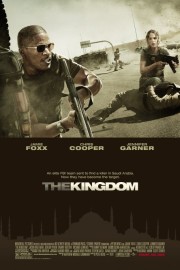The Kingdom
Peter Berg’s action-drama felt very reminiscent of a Tom Clancy thriller, specifically Harrison Ford’s second outing as Jack Ryan, “Clear and Present Danger” (always an underrated entertainment in my mind), and that’s probably the best way for a filmmaker to approach such a volatile topic as US intervention in the Middle East. However, when hundreds of Americans are killed or injured in a terrorist attack in Saudi Arabia at a predominently American community- housed with oil workers, guarded by Saudis- it’s hard to imagine resistance to a small FBI forensics team touching down in the capital of Riyadh to investigate and find the culprits. But such is the current, real quagmire the States finds itself in in the region that both the US and Saudis are touchy on the subject. The Saudis agree, but only to five days under the strict watch of one of their own; the US doesn’t (team leader Fleury, played by Jamie Foxx with a knockout combo of his “Ray” charisma and “Miami Vice” cool, goes through back channels to get the OK), and the diplomat in the country (Jeremy Piven, all flash and biting glances) is looking to get them home and not cause a fuss with the Saudi leaders. But Fleury isn’t one to back down, and eventually he gets his team- including explosives expert Chris Cooper (excellent as always), intelligence analyst Jason Bateman (scoring in a confident dramatic turn), and forensic officer Jennifer Garner (hot as always, but also smart and lethal when she needs to be, the same combo that served her well on “Alias”)- full access to the clues that could break the case open. But the terrorists, thought to be members of a group led by Abu Hamsa, learn of the team, and are looking to send another message.
While it’s true a less-than-two hour movie is hardly a model for geo-political discussion (“Syriana” came closer in a longer film), especially when it leads to an intense shootout in the streets and buildings of Riyadh (and this sequence, shot and cut with remarkable clarity and sense of geography, is one of the year’s best action-wise), Berg and screenwriter Matthew Michael Carnahan (yes, he is related to “Narc’s” Joe Carnahan) deserve more credit for the smarts they inject into the film when the fireworks aren’t going off. True, it’s not the most insightful examination of the tensions their story ignites, but that they acknowledge them at all (in particular when it comes to Garner’s character, an independent woman in a region where women do not hold the same stature they do in the States) is to their credit, and it sets the stage for a real thriller (scored with nerve-jangling tension by Danny Elfman; not one of his more memorable scores, but certainly an effective one). But what may be most memorable, and possibly most underrated, about “The Kingdom” is its’ human element. The opening attacks have the necessary dramatic punch to set off not just the characters into action but the audience into the same fits of rage and vengeance than if the blasts were real. The torturous interrogation by the Saudi officer in charge of the investigation of one of their own (whose brother was a member of Abu Hamsa) matches the recent “Rendition” is brutality, and resonates as the character is seen later in the film. But most resonate about the film is the bond that forms between the FBI team, and Fleury in particular, and Al-Ghazi (Ashraf Barhom), the Saudi colonel assigned to babysit them and make sure they don’t step on the toes of the Saudi investigation. That the filmmakers saw fit to give Al-Ghazi’s character as much heavy lifting as the FBI team is a credit to them. Initially stand offish with the team, we start to see the ways their fervor to solve the case and catch the bad guys win over Al-Ghazi (whose first name, we learn, is Faris). A discussion between him and Fleury as they look for possible suspects, and how he eventually comes to help the team when their lives are in danger, makes for one of the film’s most intriguing arcs. Lesser filmmakers would’ve made a simple “Go U.S.A.!”/all Muslims are bad propaganda film, and though there are elements of that, there’s also a sense that the filmmakers know that more can be done. Just think about the last two minutes of the film, where the type of harmful thinking that brought us to our current stalemate in this crisis is reiterated on both sides, indicating that there’s a good bet things aren’t going to get better anytime soon.










